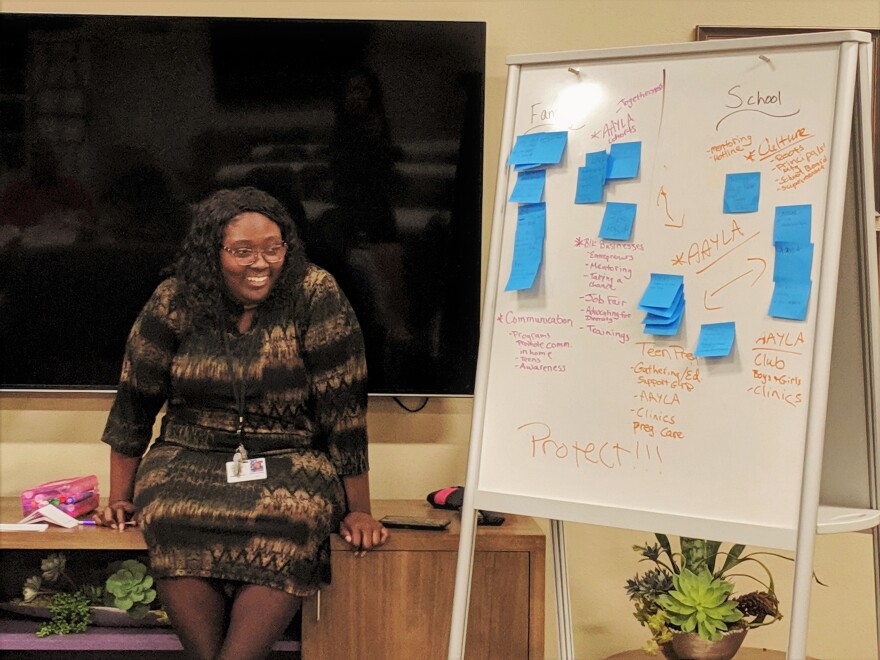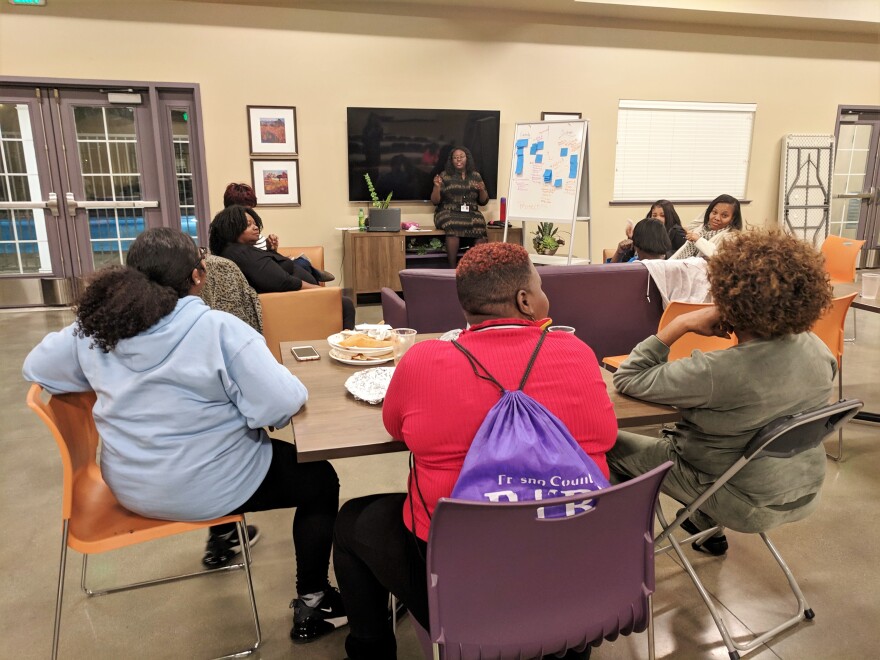In Fresno County, around 10 percent of all babies are born before 37 weeks of gestation. That’s higher than the national average, and among the highest of all California counties. For African-Americans, the numbers are even more concerning: From 2013 to 2015, black babies were 63 percent more likely to be born premature than white babies. But a new program in Fresno is trying to bring those numbers down by teaching women not just about health, but also about leadership and advocacy.
Andrea Avila still bears the scars of a medical emergency she experienced three decades ago. She was seven months pregnant with her first child when she says she felt an unusual pain. She remembers trying to tell her doctor something felt wrong. “I was trying to call him and tell him and he said ‘no, I already saw you for the day, I refuse to see you,’” she recalls. “I went right on to the hospital and from there they were like, ‘you are so lucky that you came in.’”
Her blood pressure shot up. Her life was in danger, and so was her son’s. She was given an emergency C-section – almost three months early. They both survived, though her son now lives with severe developmental disabilities.
We can’t know if earlier medical attention could have prevented this sudden delivery. But Avila’s interaction with her doctor left a bad taste in her mouth – as a woman, and as an African American. “I feel like we're overlooked because of the color of our skin, and I feel like they don't care,” she says. “A lot of us are going to die because of that. And a lot of us have.”
Now, Avila’s part of a new program that aims to prevent this from happening to anyone else.

On a Thursday night, facilitator Kristin Carraway is speaking to a dozen African-American women at a community center in southwest Fresno. It’s one of the final classes in a three-month program called the African-American Youth Leadership Academy, or AAYLA. The aim is to empower these women with knowledge and confidence – so they can be better advocates for their own health. “We don’t know how to defend our bodies,” Carraway says to the room. “If we don’t know what something is called, how do we tell a doctor how we’re feeling?”
AAYLA is an arm of the Fresno County Preterm Birth Initiative, a collaboration between UC San Francisco, Fresno State and community health organizations to bring down Fresno’s alarming rate of preterm births. “African Americans have them at even higher rates than most of the other groups,” Carraway says during an interview. “So AAYLA was created to try to address that.”

The program takes a holistic approach to health education. It brings in women of all ages, moms or not, and teaches them about the many causes of chronic stress – which is known to play a role in birth outcomes. “Preterm birth is such a complex issue. It's not just the medical piece,” says Carraway. “Parts of AAYLA address really reproductive justice. So, what all happens to a woman that affects them physically. We talk about stress, we talk about historical racism, we talk about the community and how those things impact the woman.”
Carraway hopes that if problems do arise, like they did for Avila, AAYLA will help give women the strength to speak up.
Sometimes, that self-advocacy is needed, says Dr. Subhashini Ladella. She’s a perinatologist at Community Medical Centers, and a faculty member at UCSF Fresno. She says Avila’s account of being talked down to by her doctor is not an isolated case. “I deal with a lot of moms with high-risk pregnancy and I have heard similar stories when they come to my office,” she says.

Ladella says she can understand how some patients could feel neglected. Doctors are overworked, being forced to see more and more patients. “And when they see more volumes, it's just not possible to spend the kind of time they would spend if they had less volumes per provider,” she says.
It’s unclear how often experiences like Avila’s happen, and to which groups of patients. Few studies have documented disrespect and discrimination in healthcare in a scientific way. But across the country, more and more women – especially women of color – are beginning to speak up about feeling that healthcare providers don’t take them or their concerns seriously. In a recent survey of new mothers in California, the California Health Care foundation found that 11 percent of black women reported being treated unfairly by providers because of their race – compared to 1 percent of white women.
This all sounds familiar to Kendalyn Mack. She’s a 25-year-old health advocate enrolled in AAYLA. “Building that relationship with me, taking my pain seriously, those are the things that I feel like are lacking in relationships between people like me, African-American women, and healthcare providers,” she says.

Mack now works with the Fresno County Preterm Birth Initiative, a job she found through AAYLA.
She and her classmates will soon be AAYLA’s second group to graduate. She’s excited to bring what she’s learned beyond the classroom. “This is the best place I can be when it comes to how I would like to contribute to my community,” she says.
And she hopes women sign up for the next cohort, which should begin in the spring. “I haven't seen anything like AAYLA, no matter where I live,” she says. “This is the first time I've seen anything like this specifically designed for African-American women.”
For Andrea Avila, bringing what she’s learned into the community means sharing her story. “I would like to be a light,” she says. “I would like to give to others what I didn't receive and just be a strength in someone's life.”
One way they want to start: Sharing what they’ve learned with young girls long before they have children of their own.
*An earlier version of this story stated incorrectly that Kristin Carraway works for the Fresno County Department of Public Health. She works for the Fresno County Department of Behavioral Health.





